Schwein is a music group comprising members of Buck-Tick, KMFDM, and Pig. Members Raymond Watts and Hisashi Imai, both having worked together in Schaft, were joined by Atsushi Sakurai, Sascha Konietzko and Lucia Cifarelli. In 2001 Schwein released an album, Schweinstein, which peaked at number 18 on Oricon's album chart, followed by the remix album Son of Schweinstein. Schwein toured Japan in the summer of 2001. However, Konietzko did not tour with them, citing illness and a desire to focus on KMFDM. In a 2023 interview with Visual Music Japan, Raymond Watts talked about the project and cited Schwein as his favorite collaboration to date and called Sakurai a "grand vocalist".

Mona Lisa Overdrive is the 13th album by Buck-Tick, released on February 13, 2003. The album title is mistakenly thought to have been inspired by William Gibson's cyberpunk novel of the same name but guitarist Hisashi Imai originally confused it with Robert Longo's work Samurai Overdrive, which inspired the album title. It reached number seven on the Oricon chart with 31,235 copies sold. The album is thematically connected to the previous release, Kyokutou I Love You: the last instrumental song in Kyokutou I Love You gives the musical foundation to the first song in Mona Lisa Overdrive, while the base of the last song of this album recurs in the first song of Kyokutou I Love You.

Taboo is the fourth studio album by the Japanese rock band Buck-Tick. It was released on cassette, CD and as a two-record vinyl set on January 18, 1989, through Victor Entertainment. Taboo was digitally remastered and re-released on September 19, 2002, with two bonus tracks. It was remastered and re-released again on September 5, 2007. "Angelic Conversation" was re-recorded as the b-side to the group's single "M・A・D" in 1991. "Just One More Kiss", "Iconoclasm" and "Taboo" were later re-recorded for the compilation album Koroshi no Shirabe: This Is Not Greatest Hits (1992). "Iconoclasm" was covered by J for the Buck-Tick tribute album, Parade -Respective Tracks of Buck-Tick- (2005). Taboo peaked at number one on the Oricon charts, selling 298,620 copies in the first year, and at least 300,000 in total.

Aku no Hana is the fifth studio album by the Japanese rock band Buck-Tick. It was released on cassette and CD on February 1, 1990, through Victor Entertainment. It peaked at number one on the Oricon charts and is the group's best-selling album to date. It was certified gold in the month of its release, and sold 435,080 copies in the first year of its release. The title comes from Charles Baudelaire's volume of poetry, Les Fleurs du mal.

Six/Nine is the eighth studio album by the Japanese rock band Buck-Tick. It was released in a clear purple case on May 15, 1995, through Victor Entertainment.

Sexual XXXXX! is the second studio album by the Japanese rock band Buck-Tick. It was the group's major label debut and was released on vinyl, cassette and CD on November 21, 1987 through on Victor Entertainment. The album was digitally remastered and re-released on September 19, 2002, with a different cover. Sexual XXXXX! was remastered and re-released again on September 5, 2007. The songs "Do the I Love You" and "Hyper Love" were later re-recorded for the band's compilation album Koroshi no Shirabe: This Is Not Greatest Hits (1992). "My Eyes & Your Eyes" was also re-recorded for the b-side to their "Rendezvous" single in 2007. At the time of its release, the album peaked at number 33 on the Oricon charts and as of 2011, has sold 40,000 copies.
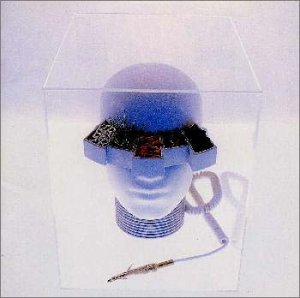
Sexy Stream Liner is the tenth album by Buck-Tick, their first on Mercury Music Entertainment, released on December 10, 1997. It reached number four on the Oricon chart with 78,820 copies sold. Starting with this album, Hisashi Imai started using the theremin in their sound. Like their previous album, Sexy Stream Liner is very influenced by the cyberpunk subculture.

Darker Than Darkness: Style 93 is the seventh studio album by the Japanese rock band Buck-Tick. It was released on June 23, 1993, through Victor Entertainment. The album peaked at number two on the Oricon chart, became a certified gold seller by July 1993, and subsequently sold 213,260 copies. Darker Than Darkness: Style 93 was digitally remastered and re-released on September 19, 2002, with two bonus tracks. It was remastered and re-released again on September 5, 2007. "Dress" was remixed and used as the opening theme for the anime Trinity Blood (2005), this version was also released as a single. The album was named one of the top albums from 1989 to 1998 in a 2004 issue of the music magazine Band Yarouze.
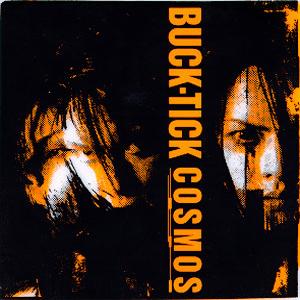
Cosmos is the ninth studio album by the Japanese rock band Buck-Tick. The album was released on June 21, 1996, through Victor Entertainment. It was the group's last album released through Victor and peaked at number six on the Oricon charts. Cosmos has sold 130,000 copies within two weeks. The album was digitally remastered and re-released on September 19, 2002, with two bonus tracks. It was remastered and re-released again on September 5, 2007. The song "Tight Rope" was later re-recorded as the b-side to the group's "Alice in Wonder Underground" single in 2007, and "Sane" was re-recorded in 2012 for their "Elise no Tame ni" single. The album was heavily influenced by electronic music, as the band started gravitating towards cyberpunk music.

Tenshi no Revolver is the fifteenth studio album by Japanese rock band Buck-Tick, released by BMG Japan on September 19, 2007. The group deliberately focused on melody and adopted a straight rock "band sound" for the album. Preceded by the singles "Rendezvous" and "Alice in Wonder Underground", Tenshi no Revolver reached number five on the Oricon Albums Chart. Buck-Tick continued the musical approach they adopted on this album for their next two as well, Memento Mori (2009) and Razzle Dazzle (2010).

Kurutta Taiyou is the sixth studio album by the Japanese rock band Buck-Tick. It was released on cassette and CD on February 21, 1991, through Victor Entertainment. The album was digitally remastered and re-released on September 19, 2002, with two bonus tracks. It was remastered and re-released again on September 5, 2007. "Speed", "M・A・D" and "Jupiter" were later re-recorded for the group's compilation album Koroshi no Shirabe: This Is Not Greatest Hits (1992).

Koroshi no Shirabe: This Is Not Greatest Hits is the first compilation album released by the Japanese rock band Buck-Tick. It was released on cassette and CD on March 21, 1992, through Victor Entertainment. All of the tracks on the compilation were re-recorded and contain different musical arrangements, because of this some argue that it is a studio or remix album. The album was digitally remastered and re-released on September 19, 2002, with a bonus track. It was remastered and re-released again on September 5, 2007. Koroshi no Shirabe: This Is Not Greatest Hits peaked at number one on the Oricon charts. It was certified gold in April 1992, and has sold 338,000 copies.

Kyokutou I Love You is the 12th album by Buck-Tick, released on March 6, 2002. It reached number twelve on the Oricon chart with 28,770 copies sold. "21st Cherry Boy" contains some lyrics from T.Rex's "20th Century Boy". The album is thematically connected to the next release, Mona Lisa Overdrive: the last instrumental song in Kyokutou I Love You gives the musical foundation to the first song in Mona Lisa Overdrive, while the base of the last song of that album recurs in the first song of Kyokutou I Love You.
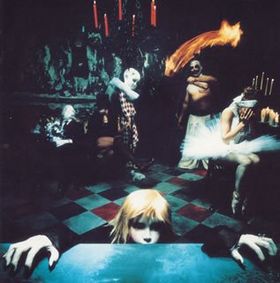
Juusankai wa Gekkou is the fourteenth album by Japanese rock band Buck-Tick, released on April 5, 2005.
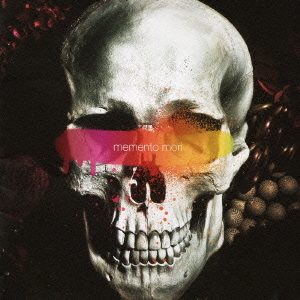
Memento Mori is the sixteenth album by Japanese rock band Buck-Tick, released on February 18, 2009. The limited edition came with a DVD of the making of the album. It reached number seven on the Oricon chart with 23,410 copies sold.

Razzle Dazzle is the seventeenth album by Japanese rock band Buck-Tick, released on October 13, 2010. Graphic artist Aquirax Uno provided the illustrations for the album's cover. The limited edition came with a DVD of music videos and an interview. It reached number six on both the Oricon chart and Billboard Japan, selling 20,384 copies.
Hisashi Imai is a Japanese musician and songwriter. He is best known as the lead guitarist of the rock band Buck-Tick since 1983. He has also performed in side-projects such as the duo Schaft with Soft Ballet member Maki Fujii, the supergroup Schwein, and the rock trio Lucy. Imai is known for his visual aesthetics, and Buck-Tick are commonly credited as one of the founders of the visual kei movement.
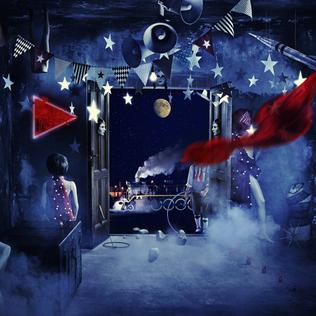
Arui wa Anarchy is the nineteenth studio album by Japanese rock band Buck-Tick. It was released on June 4, 2014. It finished 4th on the Oricon weekly chart, and also Billboard Japan, with 18,376 copies sold. The album was created with a concept of surrealism and features many references to Dada, Avant-garde, the Cabaret Voltaire and others. According to Hisashi Imai, the title of the album is actually a subtitle only, the main title is a long blank space, indicating that "it is something that cannot be seen, heard, read, or written. Impossible to pronounce. A thing that is not metaphysical."

Atom Miraiha No.9 is the twentieth studio album by Japanese rock band Buck-Tick released on September 28, 2016. It is the first album released after Lingua Sounda was made a sub-label of Victor, making it their first album since 1996's Cosmos to be released through Victor. Takeshi Ueda of AA= and The Mad Capsule Markets performs as a guest on the track "Pinoa Icchio -Odoru Atom-". The album was 5th on the Oricon weekly chart and 6th on Billboard Japan's album chart.

Abracadabra is the 22nd studio album by the Japanese rock band Buck-Tick, released on September 21, 2020 by the label Lingua Sounda, subdivision of Victor Entertainment and November 20, 2020 internationally by JPU Records. It was released in two editions in Japan: regular and limited in three formats: CD + Blu-ray, cassette and vinyl. Internationally it was released on CD and cassette with bonus tracks.


















